Introduction
The law of business (or commercial law):
- set of regulations to govern commercial transactions and business interactions;
- is characterized as civil law and covers the regulations of both private and public sectors of business (Commercial Law in UAE, 2015).
Basic business law in UAE:
- Foreign investment law;
- Competition law;
- Laws for businesses working in the territory of Dubai (licensing);
- Law on certificate origin;
- Law on commercial arbitration (Commercial Law in UAE, 2015).
These regulations are critical when it comes to the protection of the rights of versatile stakeholders such as the employees, the employers, the shareholders, and customers. The rules also help to achieve better efficiency and transparency of practices.

Background
The New Law was introduced on the 1st of April 2015.
It presented a set of important reforms concerning some fundamental regulations in the spheres of business and commerce.
Apart from establishing several additions and amendments, the New Law majorly preserved the old features and provisions that are essential to the old set of regulations (Ibrahim , 2015).
The New Law applies to:
- Private joints stock companies (JSCs);
- Public joint stock companies;
- Limited liability companies (LLCs).
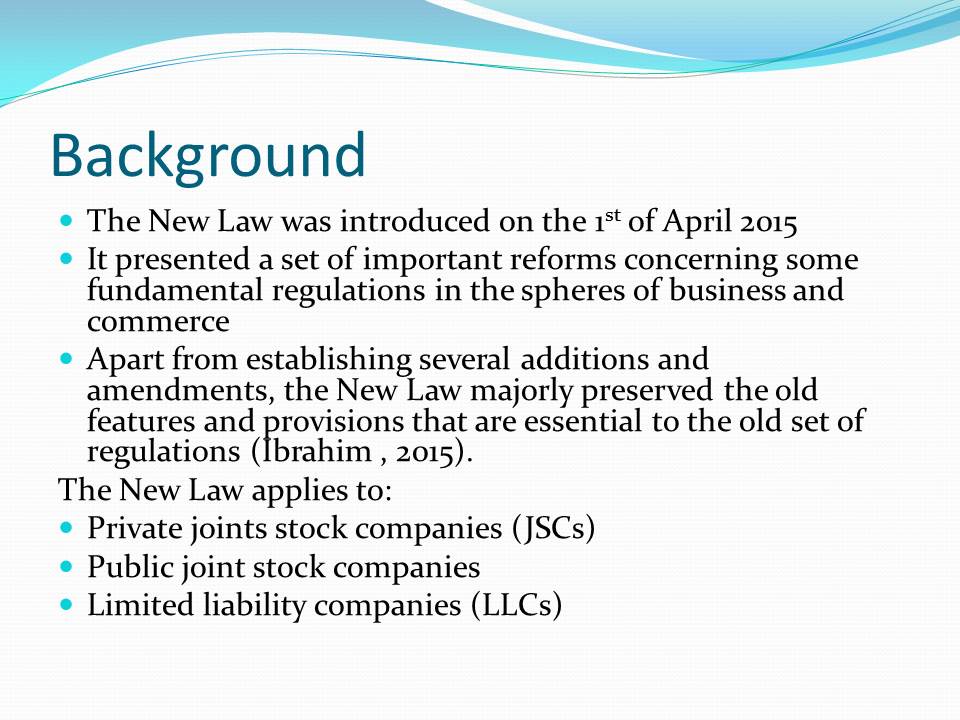
Companies the Law Does Not Apply to
Companies that work in the sectors of oil, gas, power, water, and energy sectors and that are directly or indirectly owned by the government (at least by 25%).
Companies owned by the UAE government fully or those whose ownership belongs to the government of one of the Emirates.
The entities that operate in the free zone because free zone has a regulation that excludes the relation of the New Law to such companies. At the same time, the applicability of the New Law is functional in the spheres were the free zone entities are allowed to conduct business operations onshore.
Finally, the companies that are exempted from the applicability of the New Law by the cabinet resolution or federal law (Ibrahim, 2015).
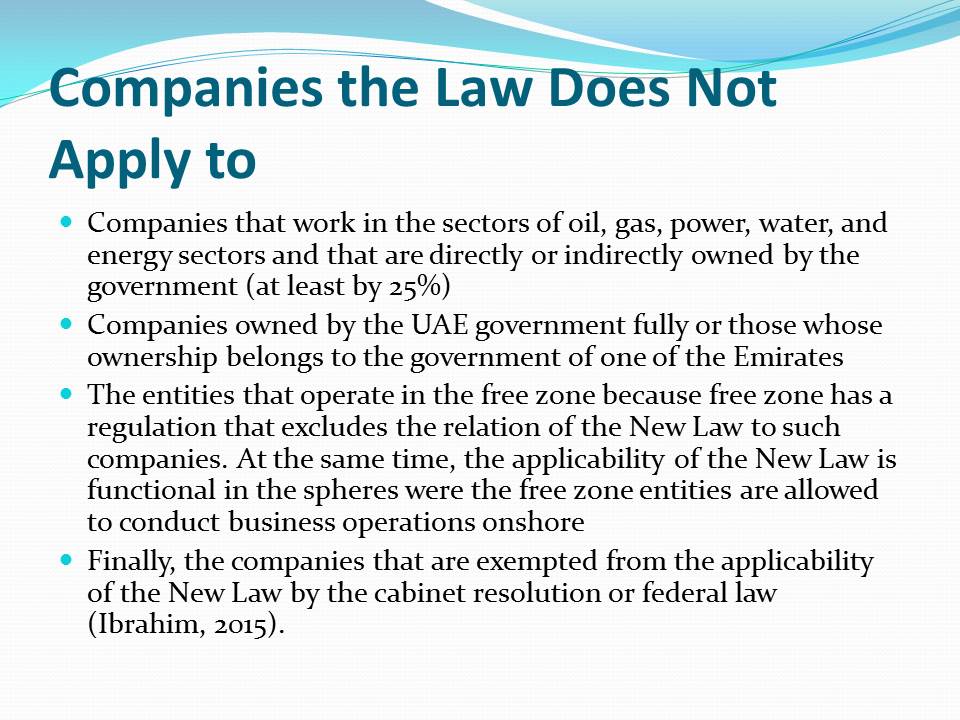
Public Joint Stock Companies
Article 107 – public JSC can be founded by ten establishers minimum (it used to be five in the old law).
Article 117 – founders of a company are permitted to own 30 to 70% of its capital, in the previous regulation the percentage limits used to be lower – 20 and 45%.
The New Law encourages the business owners to proceed with the initial public offering (IPO).
Article 129 (book-building practices of IPO) – pricing is decided by the issuers and banks in agreement with investors and selling shareholders.
Article 151 – the regulations concerning the nationality of the board members remain without changes; namely, the majority of the board members, as well as the chairperson, are to be the UAE natives.
Article 225 – the conversion of a company debt to equity is an option (this option was not mentioned in the previous regulation) (Ibrahim, 2015).
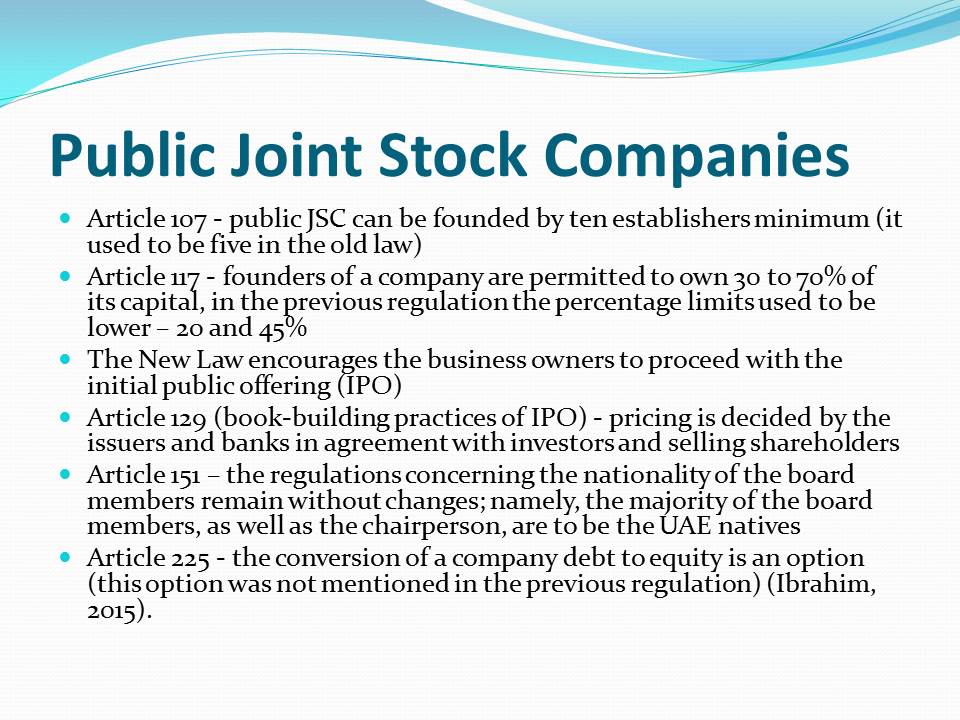
Limited Liability Companies
Article 71 – the LLCs can now be owned by sole owners (natural or corporate persons), previously, the minimal number of founders was set on two.
The minimum of managers assigned in a company may now be one (it used to be two in the old law); the maximum number of managers used to be limited to five, whereas the New Law does not provide any limit at all.
Article 86 – the persons employed as managers in one company are prohibited from operating another business that competes with the former organization (the regulation that was not present in the old law) (Ibrahim, 2015).
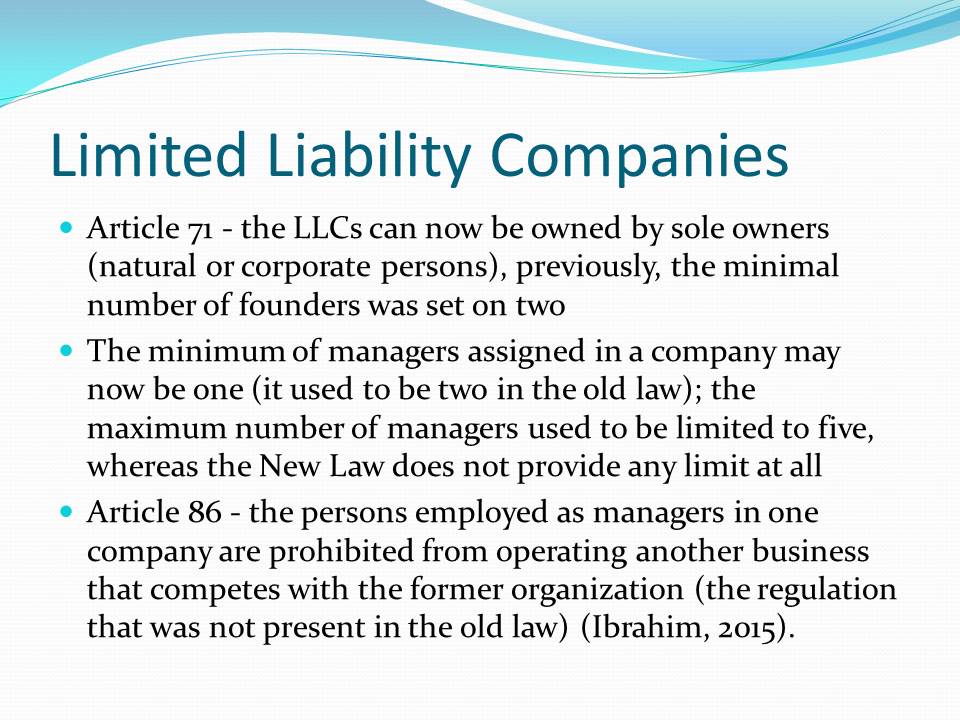
Private Joint Stock Companies
Concept of a sole founder was added.
Two founding members fully subscribed to the capital of at least 5 million Dirhams (the minimal number of founders was three and their capital had to exceed 2 million Dirhams in the old law) can start a private JSC.
Article 264 – lockup period for the private JSCs equals one financial year (in the old law, this period was assigned as twice as long).
The New Law mentions a new set of regulations related to the corporate legal structures (subsidiaries and holding companies) and the investment funds – these rules are new to the companies’ law of the UAE and were not a part of the previous regulation (Ibrahim , 2015).
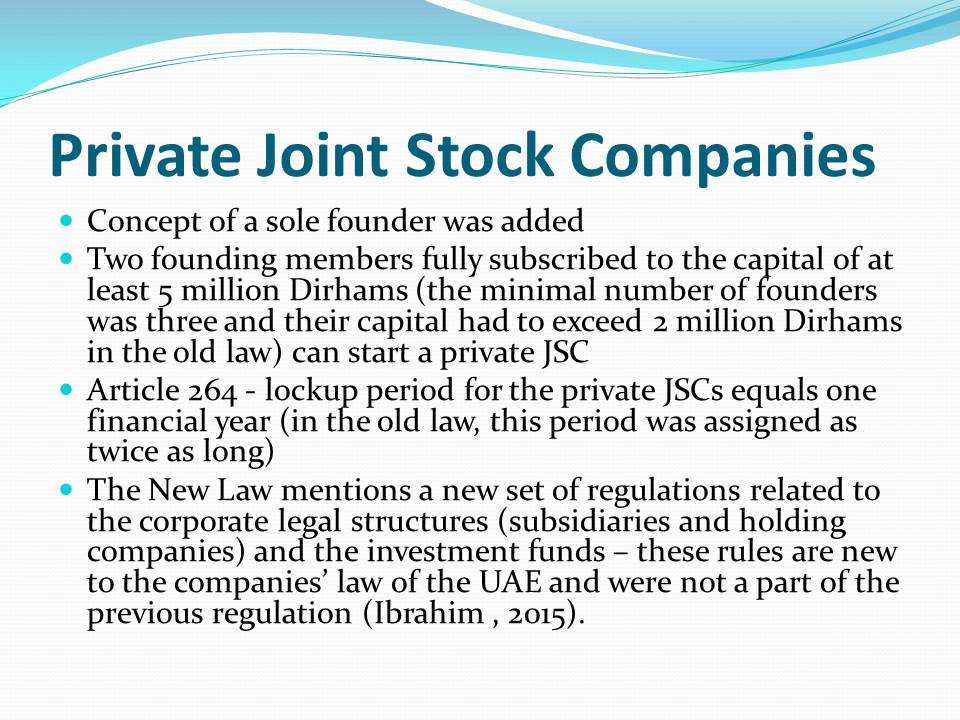
Conclusions
The most outstanding changes :
- The New CC Law offers more freedom when it comes to the establishment and financing the companies; however, the rules concerning their governance have become much stricter and more precise.
- The primary goal of the New Law is to facilitate the development of the UAE’s business sector into an environment that is regulated by the worldwide standards (PwC, 2015).
- The law serves to improve the quality and thoroughness of the corporate governance, promote social responsibility of the businesses, and ensure that protection of the shareholders (Chartered Accountants Group, 2015).
- Expert valuation of shares in kind.
- The addition of the notion of holding companies.
- The operations designed for pledging shares.
- The regulation to change the auditors once in every three years for the public joint stock companies (PwC, 2015; Anders et al., 2016).
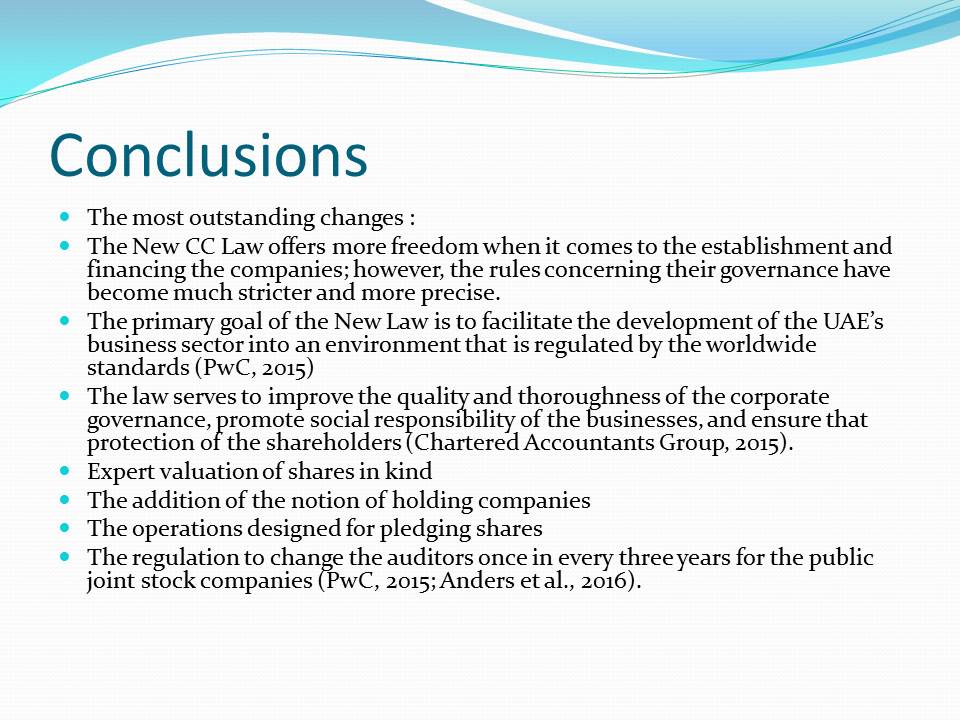
Recommendations
Since the reforms of the companies’ Law are aimed at the promotion of the initial public offerings, the addition of a sell-down option could be very attractive to the businesses considering IPOs and related transitions.
It is recommended that the business leaders review them and adjust their corporate rules accordingly in order to avoid the unintentional breach of the established lawful practices because the New Law implies that the existing LLCs would have to make significant adjustments to their regulations and structures within one year (Silver, 2015).
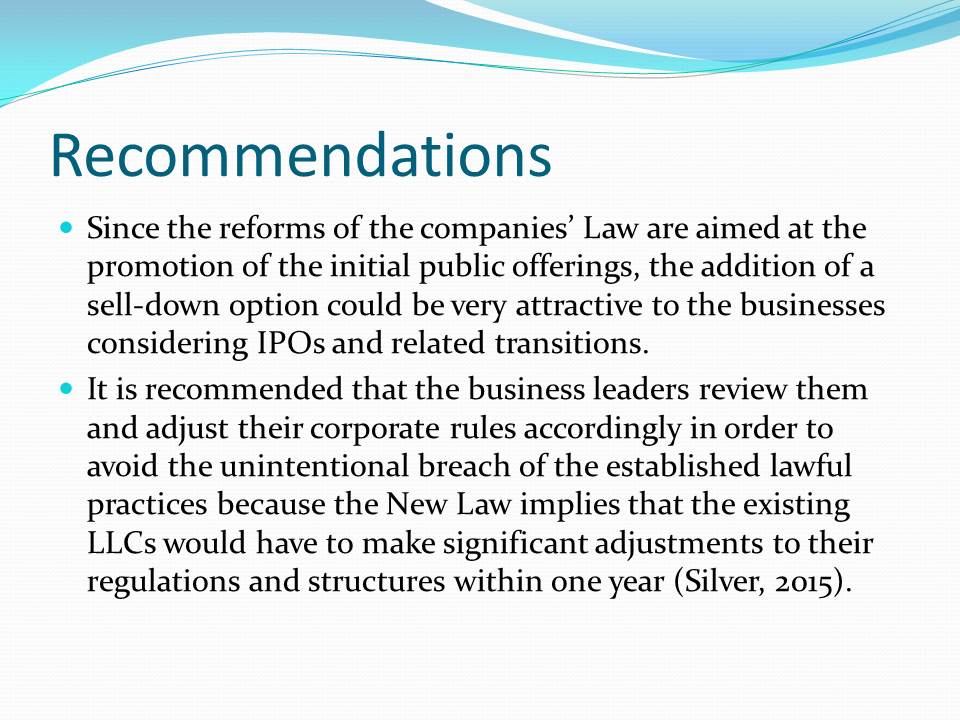
References
Anders, I., Eiler, P., Mauel, C., Lemmerz, A., Campbell, A., & Friz, C. (2016). Impacts of the New UAE Commercial Companies Law on Limited Liability Companies – What you should know. Web.
Chartered Accountants Group. (2015). New UAE Commercial Companies Law – Applicable for LLCs also. Web.
Commercial Law in UAE. (2015). Web.
Ibrahim, A. (2015). The new UAE Commercial Companies Law: A comparative view. Web.
PwC. (2015). New UAE Commercial Companies Law: Legal reforms to strengthen the legal and regulatory landscape of doing business in the UAE. Web.
Silver, J. (2015). The impact of the new UAE Companies Law on existing LLCs. Web.